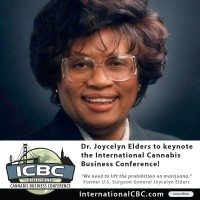
Former Surgeon General Joycelyn Elders was ahead of her time in many ways. The first African American to hold the post, she was only the 2nd woman as well. Like any great pioneer, she hasn’t been afraid to speak her mind on a whole host of issues, from marijuana to masturbation. Working under the Bill Clinton Administration, Dr. Elders proposed that the United States study the possibility of ending prohibition all the way back in 1993. Elders didn’t receive support from the administration and eventually resigned after taking flak for recommending that masturbation should be taught as part of a healthy sex education.
In 2010, Dr. Elders endorsed California’s Proposition 19 cannabis legalization measure. While the effort didn’t win at the ballot box, it did help change the national debate, benefiting the successful campaigns in Washington in Colorado two years later. On February 13th, Dr. Elders will be returning to California to speak about the need to legalize and regulate marijuana at the International Cannabis Business Conference (ICBC) in San Francisco.
This is an important time for the entire cannabis legalization movement, especially California, as Golden State voters may just be voting on a legalization measure this November. The San Francisco Chronicle interviewed Dr. Elders, asking her about her experience as a pioneer and the impacts that cannabis legalization can have:
Q: What do you think the impact of legalization would be on low-income communities? On communities of color?
A: With legalization, we would stop using our poor to subsidize private prison industries. … We should spend more money on drug treatment rather than incarceration. Also, states and federal government would not spend so much on keeping people warehoused in prisons, and could spend that money on education and community development.
People’s lives could improve by not having the specter of a criminal conviction hovering over them forever, affecting child custody, voting rights, employment, business loans, trade licensing, student aid, public housing and other public assistance. The consequences of any drug conviction are lifelong and severe and are not experienced equally throughout the population despite comparable drug use and selling rates; African Americans and Hispanics are disproportionately punished for drug law violations whether they are for drug using or selling.
Partially thanks to mainstream officials like Dr. Elders, the cannabis law reform community is leaps and bounds ahead of where it was in 1993 when she first called for our nation to study the benefits of legalization and even 2010, when she endorsed California Proposition 19. It will be great to hear from Dr. Elders at the ICBC on how she feels about the progress made and the challenges ahead for a rational national drug policy. Hopefully, she is encouraged by our recent advances and appreciates the gains that we have made, thanks to outspoken trailblazers like herself.






